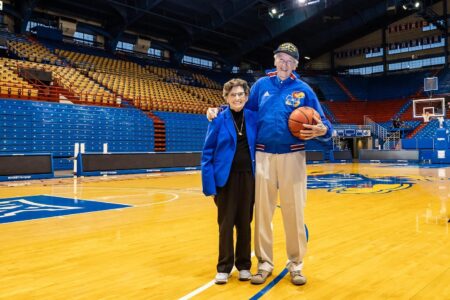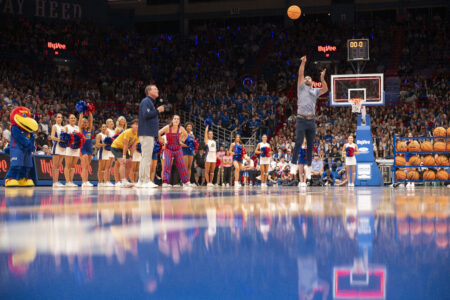Allen Fieldhouse architect Warren Corman dies at 99; Lawrence resident was last of group that designed historic basketball home

photo by: Missy Minear/Kansas Athletics
Warren Corman, right, one of the original architects of Allen Fieldhouse, is photographed at the arena with his wife Mary in 2022.
Former University of Kansas architect Warren Corman died on Thursday, KU Athletics announced.
Corman was 99, and he had been the last living architect among the seven who built Allen Fieldhouse, the now-iconic KU basketball arena that was constructed between 1952 and 1955.
“Warren Corman’s legacy will forever be woven into the fabric of the University of Kansas with his incredible contributions to Allen Fieldhouse,” KU athletic director Travis Goff said in a press release. “That historic venue would not be what it is today without Warren. We will miss his amazing stories and his passion for KU but cherish the time we have had with him. The KU Athletics’ family sends our love and condolences to (his wife) Mary and the entire family.”
Corman fought in World War II as a member of the United States Navy, including in the Battle of Okinawa in 1945. Upon returning home, he worked on the Ahearn Fieldhouse project at Kansas State before receiving his degree in architectural engineering from KU in 1950, right around when the design process began for a new $2 million basketball building at the university.
As Corman recounted in a conversation with KU coach Bill Self last year to commemorate the venue’s 70th anniversary, university officials found it difficult to obtain steel because of the ongoing Korean War and had to go to Washington, D.C., to advocate for the building’s construction.
“They said, ‘Well, we’ll make it an armory,'” Corman recalled. “We’d already done the drawing. I was the youngest, so they made me erase everything and draw it over: ‘The University of Kansas physical education building and armory.’ Had to do that on all the drawings.”
The architects added a “gun room” down where KU’s locker rooms are located to justify the military purpose, Corman said. The rest of the team working on Allen Fieldhouse included James Canole, Frank Johnson, Charles Marshall, Robert Jokisch, Robert Schober, and Thornton Beck, all of whom predeceased Corman.
From 1966 to 1997, Corman served as director of facilities with the Kansas Board of Regents, a position in which he steered more than 300 construction projects, according to KU’s press release; later, he continued to work as the university architect and special assistant to the chancellor for KU, a role from which he retired at age 84 in 2010.
Corman said of Allen Fieldhouse that he and the team “designed it to live 100 years,” and he agreed with Self that it hadn’t lost its luster after 70.
“It’s not because the architects were smart,” Corman said. “It’s because we’ve had good coaches and good players. That’s the reason.”
In 2005, Corman had said of the venue, “It will last forever, as long as you maintain it. The steel and stone don’t wear out. You put new roofs on it every 20 or 30 years, you put new windows in, you keep it painted, clean the outside. Look at Europe: You have buildings that are 1,000 years old, 800 years old. And they didn’t have the same technology we’ve had.”
Self called Corman a “treasure” in the press release and said he “played an integral role in what Kansas basketball is today.”
“He had such a wealth of knowledge about everything KU,” Self added. “Our thoughts and prayers are with Mary and his family.”
In 2004, Corman received the Distinguished Engineering Service Award from KU’s engineering school; in 2019, KU honored him and Mary with the Homecoming Spirit of 1912, which “recognizes Jayhawks who consistently display school spirit, pride and tradition.”







